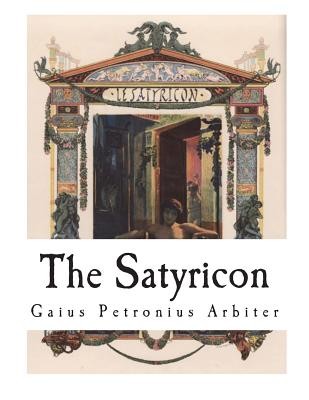
- We will send in 10–14 business days.
- Publisher: CreateSpace Independent Publishing Platform
- Year: 2018
- Pages: 170
- ISBN-10: 1721910964
- ISBN-13: 9781721910960
- Format: 21.6 x 28 x 0.9 cm, softcover
- Language: English
- SAVE -10% with code: EXTRA
The Satyricon (e-book) (used book) | bookbook.eu
Reviews
Description
The Satyricon of Petronius Arbiter. The Satyricon, or Satyricon liber (The Book of Satyrlike Adventures), is a Latin work of fiction believed to have been written by Gaius Petronius, though the manuscript tradition identifies the author as Titus Petronius. Of the many masterpieces which classical antiquity has bequeathed to modern times, few have attained, at intervals, to such popularity; few have so gripped the interest of scholars and men of letters, as has this scintillating miscellany known as the Satyricon, ascribed by tradition to that Petronius who, at the court of Nero, acted as arbiter of elegance and dictator of fashion. The flashing, wit, the masterly touches which bring out the characters with all the detail of a fine old copper etching; the marvelous use of realism by this, its first prophet; the sure knowledge of the perspective and background best adapted to each episode; the racy style, so smooth, so elegant, so simple when the educated are speaking, beguile the reader and blind him, at first, to the many discrepancies and incoherences with which the text, as we have it, is marred. The more one concentrates upon this author, the more apparent these faults become and the more one regrets the lacunae in the text. Notwithstanding numerous articles which deal with this work, some from the pens of the most profound scholars, its author is still shrouded in the mists of uncertainty and conjecture. He is as impersonal as Shakespeare, as aloof as Flaubert, in the opinion of Charles Whibley, and, it may be added, as genial as Rabelais; an enigmatic genius whose secret will never be laid bare with the resources at our present command.
- Publisher: CreateSpace Independent Publishing Platform
- Year: 2018
- Pages: 170
- ISBN-10: 1721910964
- ISBN-13: 9781721910960
- Format: 21.6 x 28 x 0.9 cm, softcover
- Language: English English
The Satyricon of Petronius Arbiter. The Satyricon, or Satyricon liber (The Book of Satyrlike Adventures), is a Latin work of fiction believed to have been written by Gaius Petronius, though the manuscript tradition identifies the author as Titus Petronius. Of the many masterpieces which classical antiquity has bequeathed to modern times, few have attained, at intervals, to such popularity; few have so gripped the interest of scholars and men of letters, as has this scintillating miscellany known as the Satyricon, ascribed by tradition to that Petronius who, at the court of Nero, acted as arbiter of elegance and dictator of fashion. The flashing, wit, the masterly touches which bring out the characters with all the detail of a fine old copper etching; the marvelous use of realism by this, its first prophet; the sure knowledge of the perspective and background best adapted to each episode; the racy style, so smooth, so elegant, so simple when the educated are speaking, beguile the reader and blind him, at first, to the many discrepancies and incoherences with which the text, as we have it, is marred. The more one concentrates upon this author, the more apparent these faults become and the more one regrets the lacunae in the text. Notwithstanding numerous articles which deal with this work, some from the pens of the most profound scholars, its author is still shrouded in the mists of uncertainty and conjecture. He is as impersonal as Shakespeare, as aloof as Flaubert, in the opinion of Charles Whibley, and, it may be added, as genial as Rabelais; an enigmatic genius whose secret will never be laid bare with the resources at our present command.


Reviews